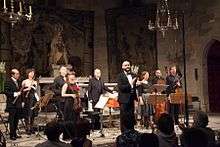Capella Cracoviensis
| Capella Cracoviensis | |
|---|---|
| Music ensemble and choir | |
 | |
| Founded | 1970 |
| Concert hall | Krakow Philharmonic Hall |
| Website |
capellacracoviensis |
Capella Cracoviensis is a professional music ensemble and mixed symphonic choir based in Kraków, Poland. It was formed in 1970 by composer and music conductor Stanisław Gałoński (b. 1936), its first director and general manager. Capella Cracoviensis specializes in early music, Renaissance polyphonies, Polish Baroque, and classical chamber music played on period instruments, as well as oratorios, and operatic scores including works of Mozart. The home base for the Orchestra is the historic Krakow Philharmonic Hall located at Zwierzyniecka street. Regular performances in many world-renowned venues have confirmed its status as one of the Poland's most outstanding period instrument ensembles.[1][2][3]
Profile
Capella Cracoviensis (CC) has made numerous CD recordings over the years, most notably of the J. S. Bach Mass in B minor, W. A. Mozart Coronation Mass, and of Darius Milhaud's 6 chamber symphonies and 3 Opéras-Minutes.[4] The group performed in many European countries including in the United States, Canada, Japan, South Korea and Taiwan, with the concert held for John Paul II at the Vatican on April 9, 2000,[1] upon his return from the pilgrimage to Bethlehem.[5]
The ensemble's performances feature instrumentalists and singers acclaimed in Poland and abroad. Its guest performers as well as concertmasters included Alessandro Moccia of the Orchestre des Champs-Élysées, Alberto Stevanin (Il Giardino Armonico, I Barocchisti of Ravenna, Ensemble Matheus), Fabio Ravasi (Europa Galante), Peter Hanson (Orchestre Revolutionnaire et Romantique); conductors Paul Goodwin, Andrew Parrott, Andreas Spering, Paul McCreesh, Roy Goodman, Fabio Bonizzoni, Matteo Messori and others. The orchestra works on projects with other early music companies such as Nachtmusique and Oltremontano.[3][6]
In 1992 the company received two prestigious awards for their recordings of Milhaud: the French Diapason d'Or, and Grand Prix du Disque of the Académie Charles Cros. In 2008 a new director was appointed by the city, and a period of transition followed. The orchestra received nearly two million zloty in new-project sponsorship money from the Polish Ministry of Culture in 2011, which is a record for music locally.[7] The funds helped them launch the Verba et Voces festival of early music featuring international stars such as Kai Wessel. The CC produced grand oratorios by Handel (Theodora, Athalia, and Deborah), as well as Le nozze di Figaro by Mozart, along with a series of great Masses and Polish Baroque concerts across the region, which were free of charge.[8][9][10]
 |
Handel - Athalia oratorio (HWV 52)
Music sample from the CC stage performance |
| Problems playing this file? See media help. | |
Music director Jan Tomasz Adamus stirred considerable controversy in January 2011 when he requested that all of the CC instrumentalists switch from standard to period instruments, or leave the group if they did not. Eight senior members were dismissed, and organized a street-level protest backed by the union committee,[11][12] but the changeover has proved beneficial for the company. The CC has experienced a music revival since it switched to old instruments, resulting in renewed interest among the general public and some enthusiastic reviews from the critics (Gazeta.pl; Wyborcza.pl).[7][13]
Notes and references
- 1 2 Polskie Centrum Informacji Muzycznej, Związek Kompozytorów Polskich (January 2002). "Capella Cracoviensis". Union of Polish Composers, Baza wiedzy (in Polish). Adam Mickiewicz Institute Culture.pl. Retrieved January 28, 2013.
- ↑ Culture reviews (2013). "Capella Cracoviensis". Krakow. Music. Cracow-Life.com. Retrieved January 28, 2013.
- 1 2 Capella Cracoviensis (2012). "About us". General information (in Polish). Capella Cracoviensis. Archived from the original on February 2, 2013. Retrieved January 28, 2013.
- ↑ M.S. (2013). "Capella Cracoviensis" (in Polish). Muzyczne Spotkania (Musical Encounters). Retrieved January 29, 2013.
- ↑ CBN (2013). "Pope John Paul II Timeline". The Christian Broadcasting Network. The Associated Press. Retrieved January 29, 2013.
- ↑ Paweł Orski (2011). "Capella Cracoviensis, orchestra and choir". Artists. Calendar (Press release) (in English and Polish). Agencja Ars Operae. Retrieved January 31, 2013.
- 1 2 Tomasz Handzlik (2012-01-07). "Capella Cracoviensis. Rewolucja już się dokonała (CC. The revolution proved a success)". Wiadomości z Krakowa (News from Krakow) (in Polish). Gazeta.pl > Kraków. Retrieved January 29, 2013.
Street protest photo, placard reads: Return laid off players
- ↑ Tomasz Handzlik (2011-02-18). "Miliony na barok: dotacja dla Capelli Cracoviensis (Millions for Baroque: dotation for the Capella)". Kultura (in Polish). Kraków.Gazeta.pl. Retrieved February 8, 2013.
- ↑ Press release. "Capella Cracoviensis: Verba et voces". Kraków concerts: 10/11 December 2011. Krakowskie Biuro Festiwalowe (Festival Bureau of Krakow). Archived from the original on March 7, 2016. Retrieved February 8, 2013.
- ↑ Press release (2011-08-22). "Capella Cracoviensis: Three by Three". Kraków concerts. Venue: St Catherine's Church. Krakowskie Biuro Festiwalowe (Festival Bureau of Krakow). Retrieved February 8, 2013.
- ↑ Tomasz Handzlik (2011). "Rewolucje w Capelli Cracoviensis (Revolution at CC)". Rozmowa z J.T.Adamusem (Interview with J.T. Adamus) (in Polish). Narodowy Instytut Audiowizualny, Dwutygodnik / 50. Retrieved January 31, 2013.
- ↑ Marek Bartosik (2012-01-15). "Muzycy orkiestry Capella Cracoviensis nadal skłóceni z dyrektorem (The musicians are still angry with the director)". Kraków » Wydarzenia (in Polish). Kraków naszemiasto.pl. Retrieved January 31, 2013.
- ↑ Jacek Hawryluk, Polskie Radio (2011-12-31). "Lubimy muzykę dawną (on early music)". 2011 w muzyce poważnej. Gra w lidze światowej (World League in Classical music). Gazeta Wyborcza wyborcza.pl. Retrieved February 8, 2013.
...rejuvenated Capella Cracoviensis joins the European league of early music (...odmłodzona i sprofilowana Capella Cracoviensis dołącza do europejskiej ligi muzyki dawnej).
Coordinates: 50°03′32″N 19°55′57″E / 50.05889°N 19.93250°E
.jpg)